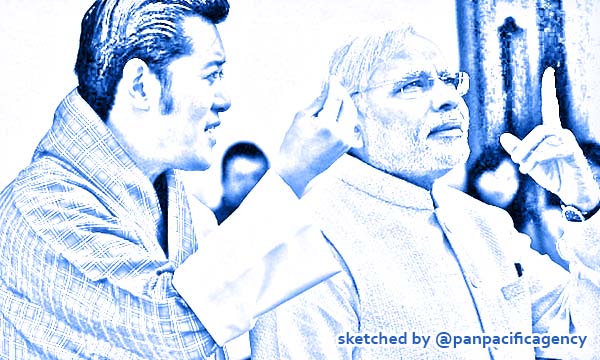[Analytics] India’s shadow looms over revived China-Bhutan border talks

Indian Prime Minister Narendra Modi with Bhutan’s King Jigme Khesar Namgyel Wangchuck at a ceremonial reception at the Royal Palace in Thimphu in a file photo. Photo: Facebook. Sketched by the Pan Pacific Agency.
After years of delay, Beijing and Thimphu have agreed to resume discussions on their disputed boundary. Analysts say breakthrough is unlikely because of Indian influence over Bhutan. Sarah Zheng specially for the South China Morning Post.
China and Bhutan agreed to resume long-delayed talks on their disputed boundary amid the ongoing border row between Beijing and New Delhi, but analysts say a breakthrough is unlikely, given Indian influence over Bhutan.
During a four-day meeting of experts between China and Bhutan last week in the southern Chinese city of Kunming, the two sides talked about a “road map to expedite” boundary talks and to hold the 25th round of discussions on the issue “as soon as possible”, according to a joint release.
The meetings, led on the Chinese side by Hong Liang, director general of the foreign ministry’s department of boundary and ocean affairs, and by Bhutan’s secretary of international boundaries, Letho Tobdhen Tangbi, were described by both as “in-depth and fruitful discussions on the boundary issue”.
China also gave Bhutan Covid-19 assistance material on the sidelines of the meeting.
There is no confirmed date yet for the boundary talks between China and Bhutan, but it will be the first meeting on the issue between the countries – which do not have formal diplomatic relations – since August 2016.
It will also be the first since the months-long border stand-off in 2017 between China and India, after Bhutan protested against China’s construction of a road in the Doklam area at the tri-junction of Bhutan, India and the politically sensitive Chinese region of Tibet.
Analysts said the boundary talks were unlikely to achieve significant progress in resolving the dispute between China and Bhutan, which has been running since 1984.
A key reason is India, which has historically close ties and considerable influence over Bhutan and was reportedly behind its refusal to accept a 1996 proposal from China that would have recognised Bhutanese sovereignty over central disputed areas, in exchange for Chinese sovereignty over the disputed area in the west, including Doklam.
The 25th round of China-Bhutan boundary talks, delayed last year due to the coronavirus pandemic, will also take place amid ongoing tensions between China and India over their border dispute.
Indian and Chinese militaries wrapped up their latest negotiations last weekend on the border issue – two months after both pulled their troops back from the Pangong Tso glacial lake in the Himalayas – without a joint statement reaffirming disengagement.
The latest expert meetings between China and Bhutan in Kunming come after Beijing’s opposition last year to a project in the Sakteng Wildlife Sanctuary in eastern Bhutan over its claims there – an area near India’s border with China – that Thimphu said was never a disputed area.
Amit Ranjan, a research fellow at the Institute of South Asian Studies at the National University of Singapore, said Bhutan was very much concerned about the boundary dispute with China, particularly after the Doklam stand-off, but that it would be very difficult to resolve the existing issues.
“They started talking in the 1980s and they are still talking,” he said. “I don’t think they are going to resolve this soon.”
Ranjan said Bhutan had historically informed Delhi informally about the nature of its talks with Beijing, including when Chinese foreign vice-minister Kong Xuanyou visited Thimphu in 2018.
India would be keeping an eye on the latest China-Bhutan talks, he said, as it would not want a Chinese presence at the Doklam tri-junction, near the Siliguri Corridor – known as the “Chicken’s Neck” – that connects Delhi and India’s northeastern states.
“The Bhutanese security, border issue and everything is deeply linked with the Indian security issue,” Ranjan said.
“While they are talking to China, Bhutan has to look at its own position, but it also has to address India’s concerns on the border, and India will never want the Chinese to come too close, especially in the ‘Chicken’s Neck’ area.”
Lin Minwang, a professor at the Institute of International Studies at Fudan University in Shanghai, said the boundary talks would provide a mechanism for China and Bhutan to maintain high-level exchanges, since India prevented Bhutan from engaging more closely with China.
“These boundary talks are a way for them to maintain dialogue and exchanges,” he said. “The backdrop this time is similar, for them to continue engaging, maintaining communication and confirming whether their stances on the issue have changed.
“Over the past two years, because of the Doklam stand-off, India’s control over Bhutan has grown more strict, so Bhutan is in a very delicate position as well.”